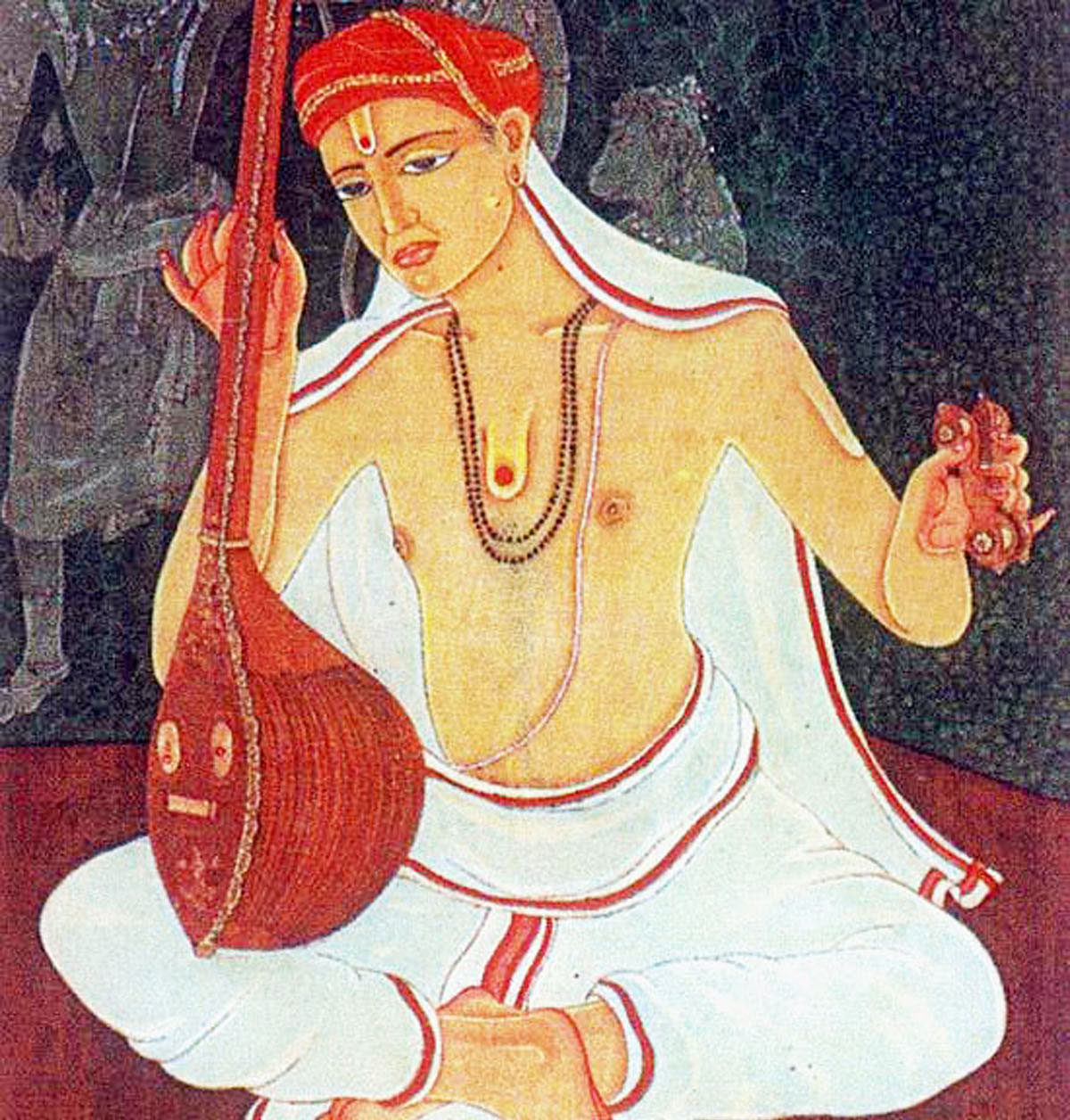Saint Thyagaraja
 |
 |
ENLIGHTENED SAINT
The Saint
Saint Thyagaraja, pronounced “thi-yaa-ga-raajaa”, was born in a Telugu family in 1767, in Tiruvarur, Thanjavur District, Tamil Nadu. With the influence of Ramayana, he became a devotee of Lord Rama. His love for God was unique and incomparable. In his songs, he talks to Rama like a dear friend.
The greatness of the Saint, Sri Thyagaraja, was in the way he expressed his Love for God in the form of Carnatic Devotional Music. A saint or a sage does not sit down and struggle to compose a song; the song simply flows out like a sweet brook or stream, or like a gentle breeze. Such a great one was Saint Thyagaraja. Many of his songs contained great spiritual guidance for sincere seekers.
Musical Genius
Saint Thyagaraja regarded music as a way to experience God’s love. Because of this he is referred to as ThyagaBrahmam. His objective while practicing music was purely devotional, as opposed to focusing on the technicalities of classical music. However, he also revolutionized and gave direction to Indian music. He also showed a flair for composing music even as a teenager.
To him, music was so creative that he could not be bound in mere traditional grammar. He saw the potentiality in new melodies and from them gave forms to fundamental melodies. His genius is evident in every song of his, but his immortal Pancharatna kritis – a set of five songs, each song set in a different raga and tala – reveal the mastery he had over musical techniques.
His compositions, are mentioned to be in a range of 729 well-known ones to a total of 22,400. Most of his compositions were on Lord Rama. It cannot be said that he composed his songs; rather, those divine words flowed out of him because of his total Love for God, manifested as Lord Rama.
Dedication to God
Sri Thyagaraja’s complete surrender to God made him live a life of detachment, though he was a house holder with a family to take care of. He refused to earn a livelihood. He had a house to live in and that was enough shelter. For food, every morning he would go round the village asking for alms – “unchavritti”, as it is called, and he would not even gather things more than what his daily needs demanded.
His elder brother, Japesa, did not like this. He had hoped that the great art and learning of his younger brother could be used to earn monetary benefits, which the Saint would not agree to. Becoming desperate, the brother partitioned the ancestral house, and threw the Lord Rama idol that Thyagaraja worshipped, into the river. Thyagaraja’s sorrow was tremendous, and in shock, he sang with a heavy heart, begging the Lord to come back to him. For him, the idol was the personification of God, not a lifeless statue. Subsequently, in a dream, he was informed where to find the idol. After recovering it, his life became meaningful again.
Honors and wealth could have been his, if only he had asked for them, but he would not. He spurned an invitation from the King himself. He sang, “Is wealth (nidhi) the source of happiness or is the proximity (sannidhi) of Rama?“
Thyagaraja took sanyasa towards the end of his life. He says in one of his most moving songs, “Without a doubt I saw Sri Rama manifested on the hill…Thrilled with ecstasy, with tears of joy, I tried to speak. He promised to bless me in five days. ” And so it happened. As promised, he attained eternal salvation on 6th January, 1847.
Thyagaraja Aradhana, the commemorative music festival, is held every year at Thiruvaiyaru in the months of January to February in Thyagaraja’s honour. This is a week-long festival of music where various Carnatic musicians from all over the world converge at his resting place. On a certain auspicious day, thousands of people and hundreds of Carnatic musicians sing the five Pancharatna Kritis in unison, with the accompaniment of a large bank of accompanists on musical instruments such as veenas, violins, flutes, nadasvarams, mridangams and ghatams.
The sports complex in New Delhi, Thyagaraj Sports Complex, was named after him. A crater on the planet Mercury is named Thyagaraja.
Such is the greatness of Saint Thyagaraja.

